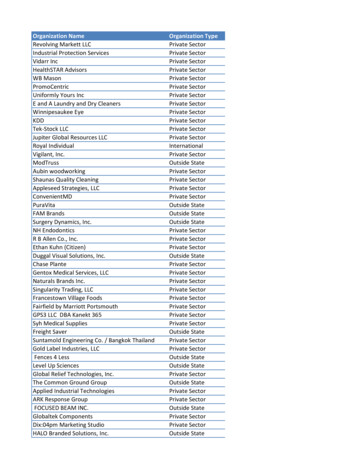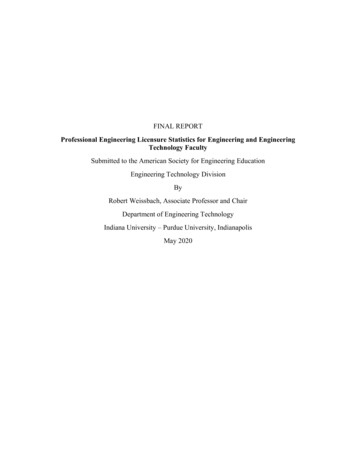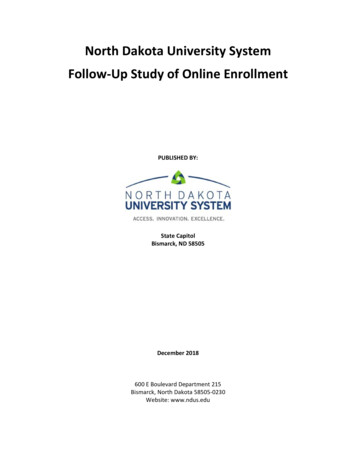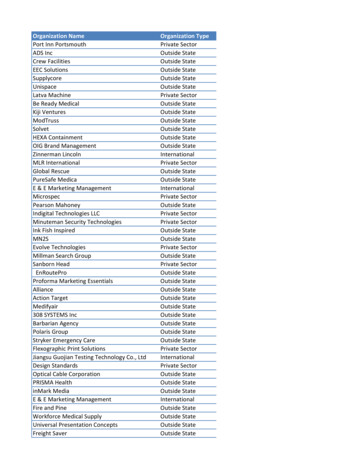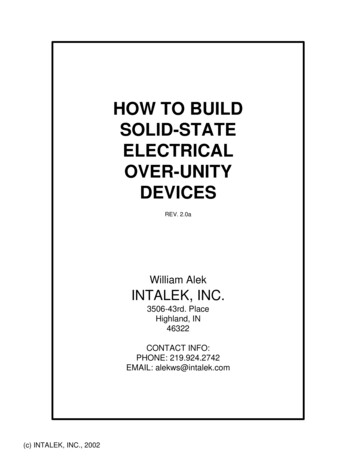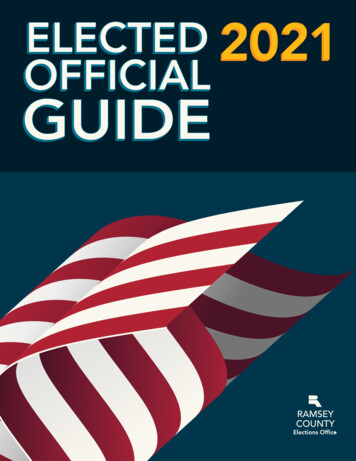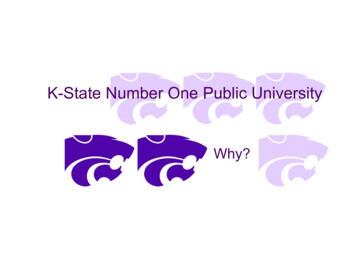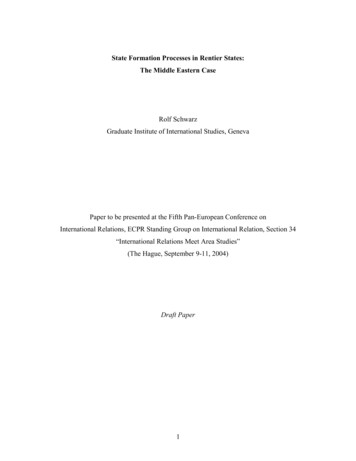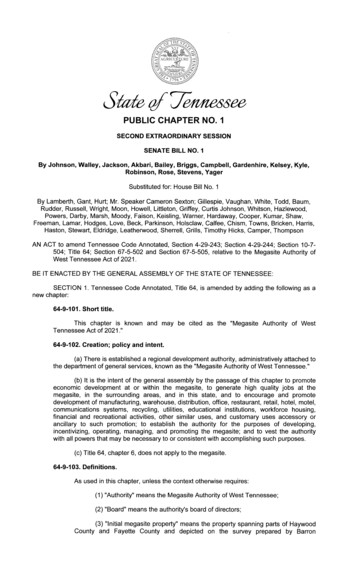
Transcription
State el J etUleSSl?ePUBLIC CHAPTER NO. 1SECOND EXTRAORDINARY SESSIONSENATE BILL NO. 1By Johnson, Walley, Jackson, Akbari, Bailey, Briggs, Campbell, Gardenhire, Kelsey, Kyle,Robinson, Rose, Stevens, YagerSubstituted for: House Bill No. 1By Lamberth, Gant, Hurt; Mr. Speaker Cameron Sexton; Gillespie, Vaughan, White, Todd, Baum,Rudder, Russell, Wright, Moon, Howell, Littleton, Griffey, Curtis Johnson, Whitson, Hazlewood,Powers, Darby, Marsh, Moody, Faison, Keisling, Warner, Hardaway, Cooper, Kumar, Shaw,Freeman, Lamar, Hodges, Love, Beck, Parkinson, Holsclaw, Calfee, Chism, Towns, Bricken, Harris,Haston, Stewart, Eldridge, Leatherwood, Sherrell, Grills, Timothy Hicks, Camper, ThompsonAN ACT to amend Tennessee Code Annotated, Section 4-29-243; Section 4-29-244; Section 10-7504; Title 64; Section 67-5-502 and Section 67-5-505, relative to the Megasite Authority ofWest Tennessee Act of 2021.BE IT ENACTED BY THE GENERAL ASSEMBLY OF THE STATE OF TENNESSEE:SECTION 1. Tennessee Code Annotated, Title 64, is amended by adding the following as anew chapter:64-9-101. Short title.This chapter is known and may be cited as the "Megasite Authority of WestTennessee Act of 2021."64-9-102. Creation; policy and intent.(a) There is established a regional development authority, administratively attached tothe department of general services, known as the "Megasite Authority of West Tennessee."(b) It is the intent of the general assembly by the passage of this chapter to promoteeconomic development at or within the megasite, to generate high quality jobs at themegasite, in the surrounding areas, and in this state, and to encourage and promotedevelopment of manufacturing, warehouse, distribution, office, restaurant, retail, hotel, motel,communications systems, recycling, utilities, educational institutions, workforce housing,financial and recreational activities, other similar uses, and customary uses accessory orancillary to such promotion; to establish the authority for the purposes of developing,incentivizing, operating, managing, and promoting the megasite; and to vest the authoritywith all powers that may be necessary to or consistent with accomplishing such purposes.(c) Title 64, chapter 6, does not apply to the megasite.64-9-103. Definitions.As used in this chapter, unless the context otherwise requires:(1) "Authority" means the Megasite Authority of West Tennessee;(2) "Board" means the authority's board of directors;(3) "Initial megasite property" means the property spanning parts of HaywoodCounty and Fayette County and depicted on the survey prepared by Barron
SB 1Surveying & Mapping, LLC, Job No. 21-198, dated August 31, 2021, for thedepartment of general services;(4) "Megasite" and "megasite of West Tennessee" mean the initial megasiteproperty, less all parcels of land conveyed in fee simple to private entities from time totime;(5) "Permitted use" means a use determined by the authority to be consistentwith or functionally related to the purposes set forth in this chapter;(6) "Project":(A) Means any or all of the following, whether or not now in existence,as determined by the authority to be consistent with the purposes set forth inthis chapter:(i) All, any part of, or any interest in, land included within themegasite; and(ii) Any building, facility, structure, or other improvement on,through, over, or under the megasite; and(B) Notwithstanding subdivision (6)(A), "project" does not include acollege of applied technology established on the megasite in accordance withtitle 49, chapter 11, part 4;(7) "Wastewater system" means the real and personal property owned by thisstate and utilized as a wastewater facility for the purposes of this chapter to serve theinitial megasite property, including collection and transmission systems, treatmentplants, and reuse or disposal systems, including, but not limited to, plants, pumps,pumping stations, pipes, treatment systems, and related easements, but excluding aservice line or other infrastructure located within the boundary of property leased bythe authority to a third party or owned by a third party; and(8) "Water system" means the real and personal property owned by this stateand utilized for the collection, treatment, storage, and distribution of water for thepurposes of this chapter to serve the initial megasite property including, but notlimited to, plants, pipes, tanks, pumps, meters, storage tanks, and related easements,but excluding a service line or other infrastructure located on a customer's side of awater meter that measures service to the customer.64-9-104. Powers.(a) The authority is vested with all powers necessary for and consistent withaccomplishing the purposes of this chapter, including, but not limited to, the power to:(1) Adopt, amend, and repeal bylaws;(2) Execute contracts;(3) Subject to the approval of the commissioner of general services, employindividuals and create, combine, consolidate, or abolish divisions within the authorityas the board deems necessary for the transaction of the authority's business;(4) Retain third-party contractors and agents as the board deems necessaryfor the transaction of the authority's business and require or waive the bond of acontractor or agent as the board may deem appropriate. The engagement of outsidelegal counsel must comply with§ 8-6-106;(5) Enforce compliance with this chapter and the rules, policies, or land useregulations adopted pursuant to this chapter in a court of competent jurisdiction andseek any remedy available under applicable law or in equity;(6) Own, acquire, purchase, option, convey, exchange, donate, sell, gift, rent,lease, improve, maintain, operate, and equip real and personal property, without theneed for separate approval from another state agency, board, or commission,notwithstanding the requirements contained in§ 12-2-112. These powers include, butare not limited to, the power to:2
SB 1(A) Acquire, whether by purchase, exchange, gift, lease, or otherwise,and develop, improve, maintain, equip, and furnish one (1) or more projects,including, but not limited to, all real and personal property that the board maydeem necessary in connection with the projects, regardless of whether or notsuch projects are then in existence;(B) Lease to others one (1) or more projects and, in the board's solediscretion, establish, charge, waive, and collect rent for the projects, andexecute amendments to such leases, which amendments, among otherthings, may provide for extending the terms of such leases, amending orextending payments in lieu of taxes due under the leases, and amending orextending rents or other payments due under the leases, together with allother terms and conditions as the board may deem advisable. The authoritymay include in a lease or amendment an option for the lessee to purchase allor a portion of the project with or without consideration;(C) Sell to others one (1) or more projects for such payments and uponsuch terms and conditions as the board may deem advisable;(D) Develop, improve, and maintain the grounds within the megasite,including, but not limited to, construction and maintenance of roads andbuildings, utilities, signage, trash removal, vegetation control, andlandscaping;(E) Grant mortgages, deeds of trust, easements, or otherencumbrances on all or a part of the megasite, including, but not limited to,subordinating this state's ownership interest in all or a part of the megasite;and(F) Have exclusive control of and responsibility for the administration ofproperties and facilities constructed or acquired pursuant to this chapter,except as otherwise expressly provided in this chapter and except as appliedto a college of applied technology established on the megasite in accordancewith title 49, chapter 11, part 4;(7) Accept and distribute grants and other incentives to induce projects tolocate at or expand operations at the megasite or otherwise to further the purposes ofthis chapter;(8) Have the exclusive authority to regulate land use, including the subdivisionof property, located within the megasite;(9) Enter into agreements with lessees of real and personal property locatedat the megasite regarding payments in lieu of ad valorem taxes and, at the authority'sdiscretion, direct a lessee to make such payments in lieu of taxes directly to amunicipality or county. A payment in lieu of taxes under such an agreement becomesand remains a first lien upon the fee interest in the leased property from January 1 ofthe year in which such payment in lieu of taxes is due. The authority and amunicipality or county intended to receive such payment in lieu of taxes may eachenforce such lien and obtain interest at ten percent (10%) per annum from the datedue and reasonable attorneys' fees, by suit filed in a court of competent jurisdiction;(10) Enter into agreements with local governments pursuant to title 12,chapter 9, regarding the provisions of governmental services to the megasite and thedistribution to local governments of payments in lieu of ad valorem property taxes;(11) Offer and provide water and wastewater services to customers located onthe initial megasite property, together with all actions necessary or incidental to theprovision of water and wastewater services, including the power to:(A) Plan, establish, develop, investigate, study, acquire, purchase,construct, equip, improve, repair, extend, maintain, and operate a watersystem or wastewater system within or outside the megasite boundary toserve the initial megasite property;(B) Buy, collect, store, process, treat, sell, transfer, dispose of, anddistribute water and wastewater from, with, or to a county, municipality, utilitydistrict, this state or an agency thereof, the United States or an agencythereof, or a person, whether public or private;3
SB 1(C) Acquire and own each type of property, franchise, or asset,whether real, personal, or mixed, tangible or intangible, whether located withinor without the boundaries of the initial megasite property, and sell, lease,exchange, or convey properties, facilities, and services for the purpose ofoperating a water system or wastewater system;(D) Establish and charge rates and set terms and conditions of servicefor the use of the water system or wastewater system and the sale ofmaterials or commodities by the authority;(E) Use a right-of-way, easement, or other similar property right heldby this state or a political subdivision of this state that is necessary orconvenient in connection with a water system or wastewater system; provided,that this state or the political subdivision consents to such use;(F) Sell or otherwise dispose of all or a part of a water system orwastewater system;(G) Adopt and enforce a pretreatment program, as that term is definedin § 69-3-103, pursuant to and in compliance with the provisions of title 69,chapter 3, part 1, and rules promulgated by the board of water quality, oil, andgas;and(H) Operate a public water system, as that term is defined in§ 68-221703, pursuant to and in compliance with title 68, chapter 221, part 7, and rulespromulgated by the board of water quality, oil, and gas;(12) Condemn land, a right in land, an easement, or a right-of-way as theboard deems necessary for effectuating the purposes of this chapter, whether or notthe condemned property interest is owned or held for public use by a person orpersons having the power of eminent domain or otherwise held or used for publicpurposes. Condemnation by the authority must not interfere with a prior public use ofthe property interest that is being condemned. The power conferred in thissubdivision (a)(12) may be exercised pursuant to any applicable statutory provision,now in force or later enacted, for the exercise of the power of eminent domain;(13) Do and perform each and every act and thing and have and exerciseeach and every power that the board, in the board's sole discretion, deemsnecessary, convenient, or appropriate, to accomplish the purposes of this chapter.The inclusion of a specific power in this chapter does not limit the broad generalpowers granted to the authority. The exercise of the authority's powers, including, butnot limited to, the powers with respect to the disposition, development, encumbrance,lease, sublease, or improvement of state property, are exclusive and are not subjectto further approval, except as expressly provided in this chapter; and(14) Promulgate rules in accordance with the Uniform AdministrativeProcedures Act, compiled in title 4, chapter 5. The board may, in the board's solediscretion, require that a board action be accomplished by rule. Otherwise, a boardaction may be accomplished by majority vote of the entire membership of the board.(b) Except as otherwise expressly provided in this chapter, and notwithstanding title4, chapter 15, part 1, or any other law to the contrary, the powers of the authority areexclusively vested in the authority.64-9-105. Board of directors.(a) The authority is governed by a board of directors. The board consists of eleven(11) voting members as follows:(1) Two (2) members to be appointed by the governor;(2) Two (2) members to be appointed by the speaker of the house ofrepresentatives;(3) Two (2) members to be appointed by the speaker of the senate;(4) One (1) member to be appointed jointly by the speaker of the senate andthe speaker of the house of representatives;(5) The governor, ex officio;4
SB 1(6) The commissioner of economic and community development, ex officio, orthe commissioner's designee;(7) The commissioner of finance and administration, ex officio, or thecommissioner's designee; and(8) The commissioner of general services, ex officio, or the commissioner'sdesignee.(b) The term for a board member who does not serve ex officio is four (4) years. Aboard member who does not serve ex officio is eligible for reappointment and may serve amaximum of two (2) full terms; provided, however, that an appointment to fill an unexpiredterm as a result of a vacancy does not constitute a full term. At the expiration of a boardmember's term, the member may continue to serve until a successor is appointed or until themember is reappointed.(c) The terms for the initial board members who do not serve ex officio begin onNovember 1, 2021.(d) Six (6) board members constitute a quorum for the transaction of business. If aquorum is present, a vacancy on the board does not prevent the board from transactingbusiness or otherwise taking an action authorized pursuant to this chapter.(e) The governor shall appoint a member of the board to serve as chair at thepleasure of the governor. The board may elect other officers as the board may deemappropriate.(f) The board shall meet at the call of the chair.(g) An ex officio board member shall not receive compensation for service as a boardmember, except that an ex officio board member, other than the governor, must bereimbursed for travel expenses incurred in the performance of the board member's officialduties. Appointed board members receive two thousand dollars ( 2,000) per month for thefirst three (3) years of the authority's existence, plus reimbursement for travel expensesincurred in the performance of the board member's official duties. After the first three (3)years of the authority's existence, an appointed board member shall only receivereimbursement for travel expenses for service as a board member. All reimbursement fortravel expenses must be in accordance with the comprehensive travel regulations aspromulgated by the department of finance and administration and approved by the attorneygeneral and reporter.(h) A board member who is not an ex officio member and who is absent from three (3)consecutive meetings may be removed from the board by the governor, the appointingauthority, or by majority vote of the entire membership of the board. The appointing authoritymay remove a board member appointed by that appointing authority for cause.(i) All board meetings must comply with the open meetings provisions compiled in title8, chapter 44.U) Each appointed member of the board shall disclose conflicts of interest inaccordance with title 8, chapter 50, part 5.64-9-106. Chief executive officer.There is established the office of the chief executive officer of the authority. The firstchief executive officer must be appointed by the governor. Thereafter, each subsequent chiefexecutive officer must be appointed by the board. All chief executive officers serve at thepleasure of the board. For each chief executive officer, including the first chief executiveofficer, the board shall enter into a contract with the chief executive officer establishing thechief executive officer's salary. All reimbursement for the chief executive officer's travelexpenses must be in accordance with the comprehensive travel regulations as promulgatedby the department of finance and administration and approved by the attorney general andreporter.64-9-107. Water and wastewater services.(a) The authority shall prescribe and collect non-discriminatory, just, and reasonablerates, and set terms and conditions of service to customers of a water system or wastewatersystem operated by the authority.5
SB 1(b) Notwithstanding any other law to the contrary, and for as long as the water systemis owned or controlled by the authority or this state, the authority has the obligation andexclusive right to provide water service to customers located on the initial megasite property.Notwithstanding any other law to the contrary, and for so long as the wastewater system isowned or controlled by the authority or this state, the authority has the obligation andexclusive right to provide wastewater service to customers located on the initial megasiteproperty. In exercising that obligation and right, the authority may, in the authority's solediscretion, enter into an agreement with a third party for the third party to provide either waterservice or wastewater service, or both.(c) The Tennessee public utility commission, utility management review board, waterand wastewater financing board, or other board or commission of like character hereaftercreated does not have jurisdiction over the authority in the management and control of theauthority's water system or wastewater system, including, but not limited to, the regulation ofthe authority's rates or terms and conditions of service, except to the extent provided by thischapter; provided, however, that the authority is subject to regulation by the department ofenvironment and conservation.(d) The authority shall not operate a water system or wastewater system at a deficitafter December 31, 2026.64-9-108. Building construction, plans review, permitting and inspections.(a) The state fire marshal has exclusive jurisdiction over all plans review, permitting,and inspections for, and enforcement of, standards designed to afford a reasonable degreeof safety to life and property from fire and hazards for all constructed, altered, or repairedbuildings or structures at the megasite, including all electrical installations, plumbingsystems, fire protection systems, and mechanical systems for all such buildings andstructures. The fire safety, electrical, and building construction safety standards establishedpursuant to §§ 68-102-113, 68-102-143, and 68-120-101 apply to all buildings or structuresat the megasite. The state fire marshal is the sole authority with jurisdiction regarding, andmay approve, equivalencies or variances from applicable code requirements for constructed,altered, or repaired buildings or structures located at the megasite including electricalinstallations, plumbing systems, fire protection systems and mechanical systems for suchbuildings or structures at the megasite.(b) This section must not be construed to limit the authority of the board of boilerrules, the elevator and amusement device safety board, or the commissioner of labor andworkforce development.64-9-109. Zoning and subdivision.(a) The property within the megasite is not subject to local land use regulations. Theproperty within the megasite must only be used for one (1) or more permitted uses. Theauthority shall not permit within the megasite a use that the authority deems noxious;provided, that recycling batteries or other materials used or associated with the operation ofa project must not be deemed inherently noxious and may be permitted by the authority.(b) Prior to constructing improvements to the property within the megasite, a site planfor the proposed improvements must be approved by the authority. The authority mayimpose reasonable setbacks, parking and loading requirements, height limitations,landscaping and buffering requirements, screening requirements, limitations on storage ofmaterials, stormwater quantity and quality requirements, and other requirements consistentwith the purposes set forth in this chapter.(c) Any subdivision of property within the megasite for the purpose of sale or buildingdevelopment must be approved by the authority prior to recording the subdivision. Approvalby a regional, county, or municipal planning commission is not required. A conveyance of aportion of the property within the megasite in violation of this section is void.(d) The transfer of fee title of property or a portion thereof within the megasite by thisstate constitutes a change in zoning for the purposes of§ 13-7-208(b)-( d).(e) A use or improvement of property approved by the authority pursuant to thissection does not constitute a nuisance to adjoining landowners for the purposes of § 13-7208( c)-( d).(f)(1) With respect to a person who violates a land use regulation adopted orestablished pursuant to this section, the authority may assess a civil penalty of notless than fifty dollars ( 50.00) nor more than five thousand dollars ( 5,000) per6
SB 1violation for each day of the continued violation. The authority shall provide eachadverse party not less than ten (10) days' written notice prior to assessing a penaltyunder this subdivision (f)(1 ).(2) In assessing a civil penalty, the authority may consider the followingfactors:(A) The harm to public health or safety or to the environment;(B) Whether the civil penalty imposed will be a substantial economicdeterrent to future violations;(C) The economic benefit gained by the violator;(0) The violator's effort to remedy the violation;(E) Unusual or extraordinary enforcement costs incurred by theauthority;(F) The amount of a penalty established by a board resolution forspecific categories of violations; and(G) The equities of the situation that outweigh the benefit of imposing apenalty.(3)(A) A person who is assessed a civil penalty may secure a review of suchorder by filing a petition with the authority not more than ten (10) businessdays after the levy of the civil penalty, setting forth the grounds and reasonsfor such person's objections and asking for a hearing in the matter involvedbefore the board.(B) If a person files a timely petition for review of a penalty undersubdivision (f)(3)(A), the board shall grant the petitioner forty-five (45) days toprovide proof satisfactory to the board that the petitioner cured, remediated,mitigated, or took other corrective action to resolve the circumstances thatwere the basis of the penalty. After the forty-five-day period has tolled, theboard shall consider the actions of the petitioner and issue a final orderupholding the initial civil penalty, reducing the civil penalty, or vacating the civilpenalty.(C) A party aggrieved by an order of the board under subdivision(f)(3)(B) may file an appeal of the decision with the board not later than ten(10) business days after the decision is final.(D)(i) An appeal filed under subdivision (f)(3)(C) must be conducted asa contested case and must be heard before an administrative judgesitting alone pursuant to §§ 4-5-301(a)(2) and 4-5-314(b), unlesssettled by the parties.(ii) The administrative judge to whom the case has beenassigned shall convene the parties for a scheduling conference withinthirty (30) days of the date the appeal is filed.(iii) The scheduling order for the contested case issued by theadministrative judge must establish a schedule that results in a hearingbeing completed within sixty (60) days of the scheduling conference,unless the parties agree to a longer time or the administrative judgeallows otherwise for good cause shown.(iv) An initial order must be issued within thirty (30) days ofcompletion of the hearing. The administrative judge's initial order,together with earlier orders, if any, issued by the administrative judge,become final pursuant to § 4-5-315, unless appealed to the chancerycourt of Madison County not less than ten (10) business days after theissuance of the order in accordance with § 4-5-322.(4) If a petition for review of a civil penalty is not filed with the authority withinten ( 10) days after the civil penalty is served in a manner authorized by law, then theviolator is deemed to have consented to the civil penalty, which consent becomesfinal.7
SB 1(5) Whenever a civilappeal the civil penalty, theCounty for a judgment andproceedings, shall treat thejudgment.penalty becomes final because of a person's failure toauthority may apply to the chancery court of Madisonseek execution of such judgment. The court, in suchfailure to appeal such civil penalty as a confession of64-9-110. Lessee's construction of projects.(a) The state's property interest in the megasite is not subject to a lien recordedpursuant to title 66, chapter 11.(b) A lease between the authority and a third-party lessee for land within the megasitemust provide that, in the event that a lien is filed against the third-party lessee's leaseholdinterest pursuant to title 66, chapter 11, the third-party lessee must record a bond inaccordance with § 66-11-142 no later than thirty (30) days after the earlier of the date thethird-party lessee receives notice of the claim of lien or the date the lien is recorded.(c) Notwithstanding any other law to the contrary, a third-party lessee is not an agentof the authority or this state for purposes of§ 66-11-102(d).(d) Notwithstanding any other law to the contrary, the authority and a third-partylessee are not required to comply with § 66-11-142 for construction activities undertaken bythe third-party lessee pursuant to a lease between the authority and the third-party lessee.64-9-111. Relation to existing laws; construction.(a) The powers conferred on the authority by this chapter are in addition andsupplementary to the powers conferred on the authority by other law. Projects undertaken byan entity other than this state are not deemed to be an undertaking of a Tennesseegovernmental entity.(b) This chapter must be liberally construed to effectuate its purposes.64-9-112. State building commission.Notwithstanding § 64-9-104(a)(6), a lease of real property, and all amendmentsthereto, entered into by the authority, and all capital grants and corresponding accountabilityagreements are subject to approval by the state building commission pursuant to title 4,chapter 15, part 1. An improvement to be constructed by a third party; a sublease by a thirdparty; or a consent, approval, contract, or other action taken by the authority or a lesseepursuant to a lease previously approved by the state building commission is not subject toadditional approval by the state building commission. This chapter does not affect otherrequirements of the Tennessee board of regents necessary to obtain an otherwise requiredapproval from the state building commission relating to a college of applied technologyestablished on the megasite in accordance with title 49, chapter 11, part 4.64-9-113. Authority records.(a) The authority adopts as its official policy the principle of open records and, unlessotherwise provided by this section or other applicable law, the information and documentsmaintained, received, or produced by the authority are public records, as that term is definedin§ 10-7-503.(b) A binding contract or agreement entered into or signed by the authority thatobligates public funds, together with all supporting records and documentation, is not a publicrecord until the contract or agreement is entered into or signed.(c) A public record, including proprietary information, received, produced, ormaintained by the authority is confidential for a period of five (5) years if the chief executiveofficer, with the affirmative agreement of the attorney general and reporter, determines thatthe record is of such a sensitive nature that the record's disclosure or release would seriouslyharm the ability of the authority to effectuate the purposes of this chapter. After five (5) yearsfrom the date the confidentiality determination is made, the record made confidential by thissubsection (c) becomes a public record and is open for public inspection in accordance with§ 10-7-503.(d) All trade secrets received, maintained, or produced by the authority must remainconfidential.(e) As used in this section, unless the context otherwise requires:8
SB 1(1) "Proprietary information" means commercial or financial information that isused either directly or indirectly in the business of a person submitting information tothe authority, and that gives such person an advantage or an opportunity to obtain anadvantage over competitors who do not know or use such information; and(2) "Trade secrets" means manufacturing processes, materials used inmanufacturing processes, and costs associated with the manufacturing process of aperson submitting information to the authority.(f)(1) This section does not apply to records containing marketing information orcapital plans that are provided to the authority with the understanding that the recordsare now and should remain confidential. Any such record must remain confidentialuntil such time as the provider thereof no longer requires the record's confidentiality.(2) As used in subdivision (f
West Tennessee Act of 2021. BE IT ENACTED BY THE GENERAL ASSEMBLY OF THE STATE OF TENNESSEE: SECTION 1. Tennessee Code Annotated, Title 64, is amended by adding the following as a new chapter: 64-9-101. Short title. This chapter is known and may be cited as the "Megasite Authority of West Tennessee Act of 2021." 64-9-102.
